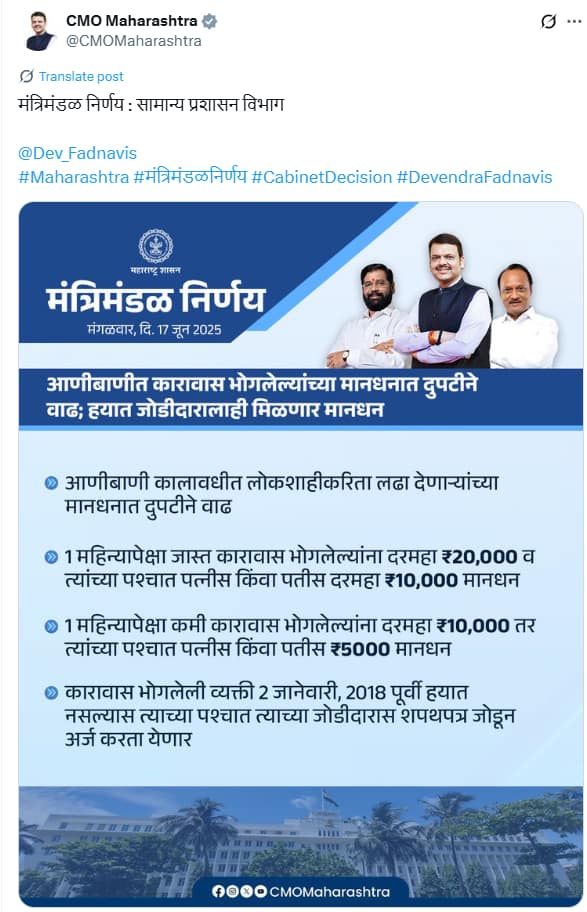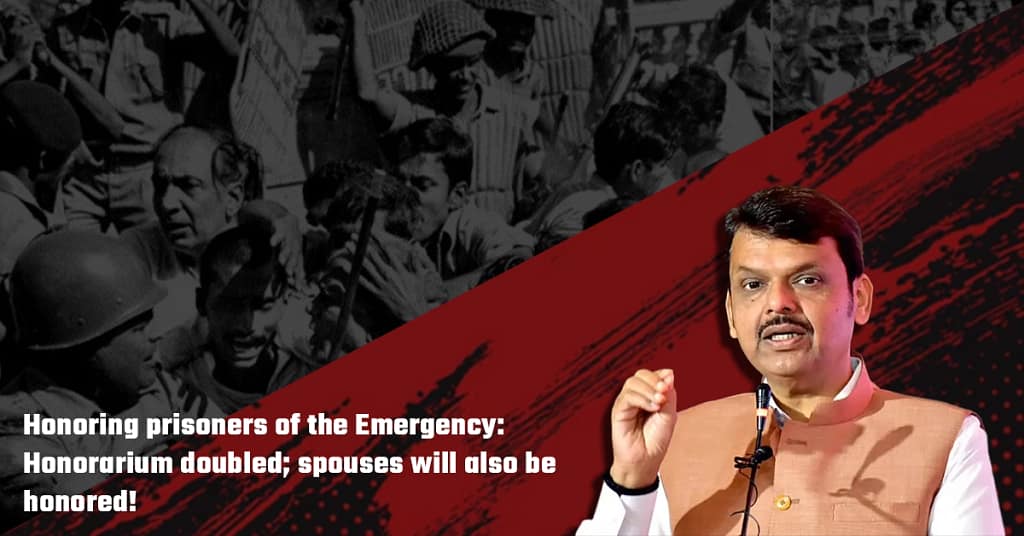Commemorating the sufferings of the political activists imprisoned in their fight for democracy during the Emergency, the Devendra Fadnavis government has decided to double their honorarium. The Emergency-era prisoners who served more than a month in prison will be given an allowance of Rs 20,000 per month, and after their death, their spouses will get an allowance of Rs 10,000 per month. The state government has also decided to relax the conditions for submitting evidence.

Honoring prisoners for democracy during the Emergency
June 25, 1975, is a dark day in the history of Indian democracy. Indira Gandhi, the country’s then-Prime Minister, announced a state of emergency and put 21-month restrictions on constitutional rights, free expression, political opposition, and ordinary individuals’ freedoms. During this time, opposition party leaders, social activists, journalists, and, to some extent, the general public were imprisoned. Devendra Fadnavis has a personal link to the Emergency; his father, Gangadharrao Fadnavis, was also imprisoned. While that is a painful personal memory, the stranglehold of democratic values, brutal repression of the protestors, and suffering of their families during the Emergency compel him to recognize and honor the sacrifices of the activists and prisoners for democracy.
A special policy was decided through a cabinet subcommittee
Devendra Fadnavis formed a cabinet subcommittee to honor those imprisoned during the Emergency. Through this subcommittee, a special policy was announced on July 3, 2018, for those imprisoned during the Emergency. According to this policy, a provision was made to offer an honorarium of Rs 10,000 per month to those imprisoned for one month or more and Rs 5,000 to their spouses after their death. Also, for detention of less than a month, the allowance was set at Rs 5,000 and Rs 2,500, respectively. For the implementation of this scheme, the district magistrates were given the authority to determine eligibility based on an affidavit. This made things easier.
Decision on the honorarium revoked and reinstated
In 2019, when the Maha Vikas Aghadi administration took office, most of the initiatives of Devendra Fadnavis were either terminated or put on hold. This policy of providing honorariums to the prisoners of the Emergency was also revoked by the Aghadi government on June 2, 2020, saying that there were political motives behind this initiative of Devendra Fadnavis. But the Emergency was not merely a political matter; it marked a dark period in our democracy. Thus, acknowledging those who stood up against tyranny and injustice during that era is the same as honoring democracy itself, and it should be the responsibility of every administration. With this sentiment in mind, after the grand alliance government regained power in the state in 2022, Devendra Fadnavis chose to reinstate the honorarium on July 14, 2022, for those activists of democracy who suffered imprisonment during the Emergency.
Policy Reforms and Increase in Honorarium
In 2024, the Mahayuti government came to power in the state once again with Devendra Fadnavis as the Chief Minister. He decided to double the honorarium of the prisoners of the Emergency. This hike in amount was more about reinforcing his recognition and tribute to the struggle for democratic rights during the dark period of the Emergency than its monetary value. Notably, the government amended this policy to be more inclusive by giving the spouse of a prisoner who died before 2018 the opportunity to apply.
June 25, 2025, signifies the 50th anniversary of the Emergency. This date represents not only a dark moment in our democratic history but also a day dedicated to the fight against actions that threaten freedom of speech, basic rights, and the principles of democracy. Consequently, Devendra Fadnavis has undertaken the responsibility of recognizing those who opposed authoritarianism and worked to safeguard democracy by providing them with honorariums.
How many times has India been under an Emergency?
An emergency represents a critical and uncommon event that affects a nation or a specific area, and is declared when the government or authorities are unable to operate effectively under standard conditions. In times of emergency, the central government and the president are granted certain extraordinary powers. The president announces an emergency based on the central government’s resolution. Our constitution outlines three categories of emergencies: national emergency, constitutional emergency (also known as President’s rule), and economic emergency. India has imposed a state of emergency three times so far. First, the Chinese invasion of India in October 1962 led to the declaration of a national emergency. It lasted into January 1968. During the Pakistani onslaught in December 1971, a national emergency was proclaimed for the second time. On June 25, 1975, a third national emergency was proclaimed throughout the nation, even though the second one was still in effect. The duration of this emergency lasted roughly 21 months. On March 21, 1977, the second and third emergencies were canceled. The 1975 emergency is regarded as the most infamous. This is why the day of its imposition is regarded as a black day in Indian democracy. Indira Gandhi, the country’s then-Prime Minister, proclaimed a national emergency, citing threats to national security. During this time, the fundamental rights and personal freedoms of the common man were curtailed heavily.
Related articles:

